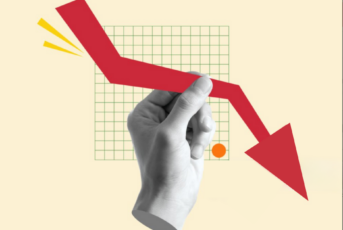The stock (and real estate) markets are hitting all time highs. Investors are optimistic and excited about the recent gains and want to buy more stocks and real estate. Financial news outlets bring on experts that extol how prices will continue to rise, but it’s during times like these that we forgot that markets can and do decline periodically. At some point, and no one can truly predict when, the markets will decline and these same news outlets will use terms like “crash” and “correction” and bring back the same experts who now have a gloomier outlook. While there is no technical definition of a stock market crash, there is one for a correction. A correction is when the market declines 10 percent from its peak. Whichever term is used, are you prepared for the next correction or crash?
What is the market?
It’s important to remember that the stock market is a representation of the overall health of the economy. The stock and bond markets are comprised of actual companies and is considered the best leading economic indicator, because investors buy companies with the expectation of future performance and not how the company performed in the past. The stock market is a remarkable medium that allows savers to invest and grow their wealth. It is the most fluid and transparent market in the world. With only a few hundred dollars, you can easily and cheaply buy an S&P 500 indexed mutual fund that gives you exposure to 500 of the best companies in the world.
A Correction is Good
At some point, the sentiment will turn negative, prices will start to decline, and there will be a correction. But don’t be discouraged. Because the stock market is traded daily in an open market, it has a lot of short-term volatility in reaction to geopolitical, economic, and even sometimes unrelated news. The key word is short-term. In the short-term, markets corrections are healthy and necessary for continued growth in the long-term. This is because the market has an almost self-correcting mechanism that signals when prices have gone up too much too fast or sometimes it overreacts to news that may not even have any true bearing on the overall health of the economy.
These minor short-term tremors are good to ensure the market does not get overvalued and it creates buying opportunities because investors typically oversell on bad news. No one knows what the political or economic landscape will look like in the next 5, 10 or 20 years, but I am confident that you will experience at least one, if not several, corrections in the meantime. When in the midst of a correction, the media is littered with negative news and outlooks with “experts” in the industry predicting that the negative trend will continue. Many investors panic and sell which is a bad idea. In fact, during a correction is the best time to buy because stock prices decline due investor panic and overselling. The stock market and real estate will experience a correction at some point, but no one can consistently predict future returns, not even the experts. Sure, you might get lucky once or twice by selling just before the correction, but the more important and financially savvy is knowing when to buy again as the markets recover.
Can You Wait 5 Years?
Investing is a long-term endeavor, not a short-term gamble. Even though markets are very liquid and accessible, only invest your savings if you intend to hold the investment for at least 5 years. One thing we always advise our private wealth management clients is that if your time horizon is 5 years or less, do not invest. It’s simply too short of a time period to speculate on the market. For example, if you’re saving to buy a house or start a business within the next 5 years, it is better to keep your money in a savings account where it will be liquid and not exposed to short-term market volatility.
In Closing
Since the market bottom of 2009, we’ve had several corrections in the market which at that time seemed significant, but are now just a blip to the overall growth of the market. Timing the market is impossible to do – yes, impossible. Some people wrongly assume that corrections or recessions happen every set number of years, but that’s not the case. A correction could be caused by a number of factors, and you can never consistently predict one. What is important and what is predictable, is how prepared you are for it and how will you react when the headlines turn negative. Warren Buffett has an excellent quote: “be fearful when others are greedy and greedy when others are fearful;” when the market experiences a correction, be prepared to be greedy and buy when others are selling out of panic.
Have a financial question about market corrections and investing? Contact ACap Asset Management at info@acapam.com or 818-272-8511.
Ara Oghoorian, CFA, CFP® is the president and founder of ACap Asset Management, Inc., a “Fee-Only” investment management firm located in Los Angeles, CA specializing in helping doctors and physicians make sound financial decisions.









